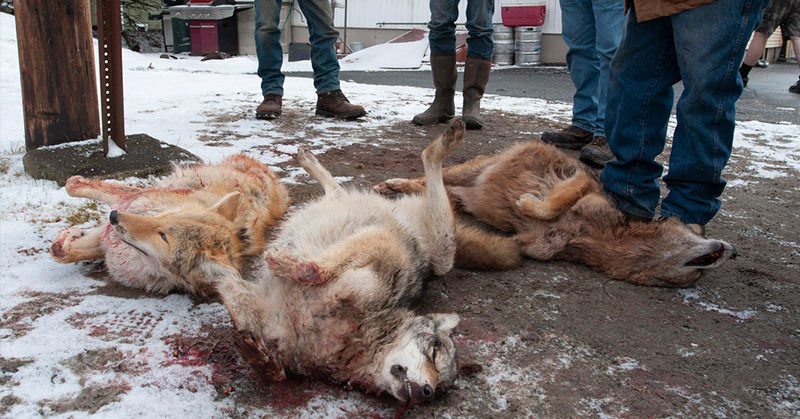Dogfighting and cockfighting have been largely condemned across most of the United States. They are cruel and inhumane and are now illegal in all fifty states.
Wildlife killing contests are a lesser-known but equally barbaric blood sport. Sadly, this sport is still legal in 45 states across the country. In September 2020, Washington became the seventh state to ban wildlife killing contests.
Wildlife Killing Contests
Killing contests are almost exactly what they sound like. Participants attempt to kill the most and/or the largest animals within a specific amount of time in order to win. Contestants usually compete for cash prizes or for hunting equipment.
Sometimes, these contests are judged by a system that allocates points for each species, by gender (largest male or smallest female), or by characteristics such as “the largest ears” or “the mangiest mutt” [1].
The most common animals that are targets in these contests include:
- Bobcats
- Coyotes
- Foxes
- Prairies dogs
- Rabbits
- Raccoons
- Squirrels
- Woodchucks
- Mountain lions
- Wolves
One of the fundamental guiding principles of hunting is the notion of fair chase, which dictates that the hunter should not gain an unfair advantage over the hunted. These contests completely ignore that, and participants often use high-tech equipment to lure animals out into the open [1].
There is No Justification for Killing Contests
These contests promote the idea that killing animals for cash prizes is fun. Mothers are killed, orphaning their young. This could lead them to starvation and puts them at greater risk for dying from predation or exposure.
Participants in the contests try to justify the activity by saying that they’re helping farmers by protecting livestock. This, however, is not backed by science. It is also not sound wildlife management.
Evidence is Severely Lacking
Research has shown that killing contests don’t actually reduce numbers of wildlife, and in some cases, it could increase their numbers. For example, indiscriminately killing coyotes does reduce their numbers momentarily, but it also creates chaos and instability within the coyote family structure. This allows more coyotes to reproduce, encourages the immigration of outside coyotes, and increases conflicts with livestock [1].
Hunter and wildlife biologist Carter Niemeyer used to work for the US Department of Agriculture’s Wildlife Services. The organization kills predators primarily for the benefit of stockmen.
He told a story about a time when they sent a helicopter to Montanna to randomly shoot a bunch of coyotes. He got a call from a rancher a couple days later who said that since they shot the animals, he’s had coyotes coming and killing his sheep. Prior to the shooting, he’d had no problems with coyotes that entire year.
“When you have coyotes eating rodents and rabbits around sheep, that’s desirable. Random shooting — ‘preventive control’ — creates chaos, removing the good coyotes. So other coyotes immediately come in to fill the void, and some may be undesirables. Same with bears and mountain lions,” explained Neimeyer [2].
All species, even coyotes, play an important role in the ecosystem. Coyotes help to control disease transmission, they clean up animal carcasses, they keep rodent populations in check, they increase biodiversity, they remove sick animals from a gene pool, and they protect crops [1].
Read: This is Why We Need Wildlife Crossings
Washington Bans Killing Contests
In a seven to two vote, Washington has now joined Arizona, California, Colorado, New Mexico, Massachusetts, and Vermont on the list of states where killing contests are banned [3].
The new rule prohibits contests for coyotes, bobcats, crows, foxes, and raccoons, among others. These animals all typically have few protections under state laws. The Humane Society has been fighting against the barbaric practice for years, and have been conducting undercover investigations in Oregon, New York, New Jersey, and Maryland.
Thousands of these contests still take place across the entire country every year, but this latest ban is the sign of a growing trend to end them.
Wildlife organizations have spoken out against killing contests:
“Coyote hunting contests are not only ineffective at controlling coyote populations, but these kinds of competitive coyote hunts are raising concerns on the part of the public and could possibly jeopardize the future of hunting and affect access to private lands for all hunters,” the Vermont Fish and Wildlife Department said [1].
The Arizona Game and Fish Commission also released a statement, saying that these contests do not reflect the overall hunting community, and threatens hunting as a legitimate wildlife management function.
After the recent ban in Washington, citizens, activists, and wildlife management authorities alike are hoping other states will follow suite. As the Humane Society says, there is no place for wildlife killing contests in modern society.

